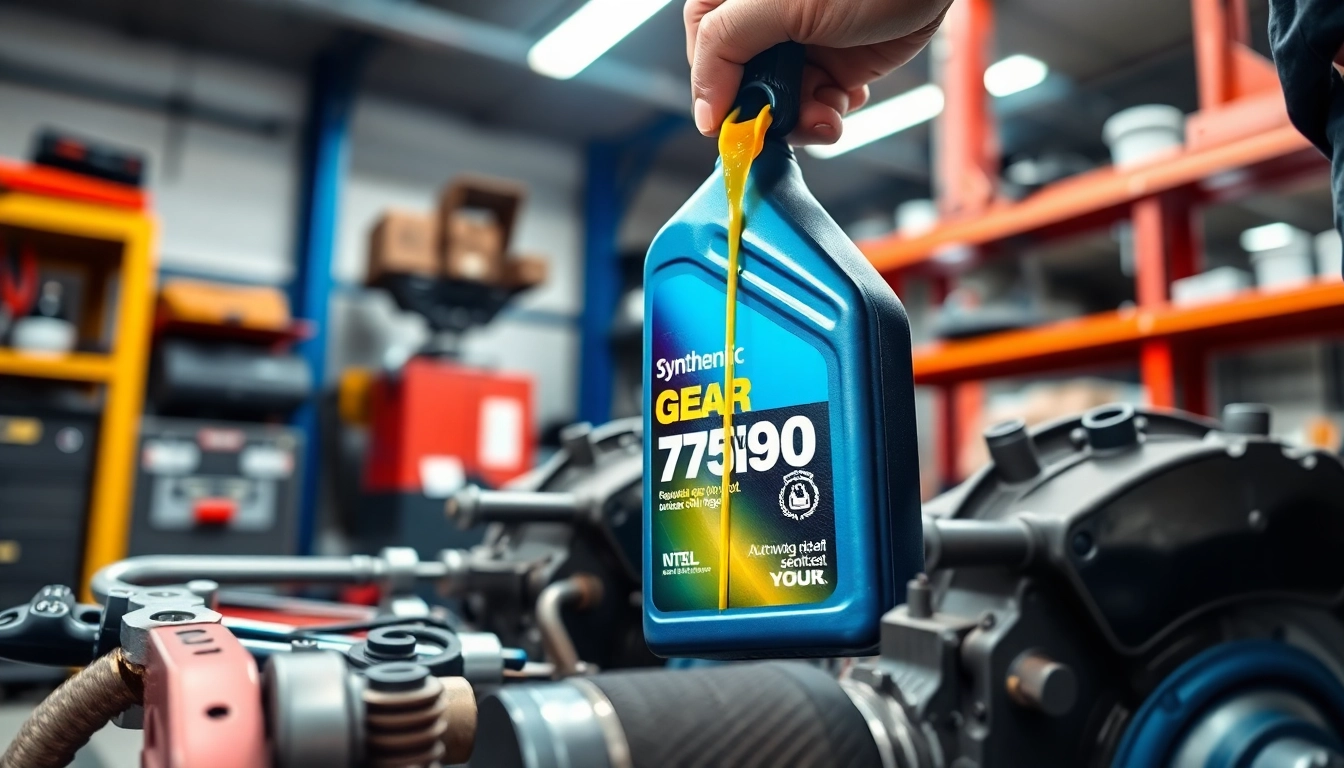Understanding Synthetic Gear Oil 75W90
What is Synthetic Gear Oil 75W90?
Synthetic gear oil 75W90 is a specially formulated lubricant that serves a critical role in the performance and longevity of various automotive and industrial machinery components. This multi-grade oil has a viscosity rating of 75 in cooler temperatures and 90 in warmer conditions, making it versatile for different operating environments. It is predominantly designed for use in manual transmissions, differentials, and transfer cases, catering to the demands of environments that require both durability and efficiency.
Synthetic gear oils are characterized by their unique formulation, which utilizes synthetic base oils in combination with advanced additive technology. This offers significant advantages over conventional mineral oils, making synthetic options a preferred choice for enthusiasts and professionals alike. Moreover, synthetic gear oil 75w90 provides excellent protection against wear, higher thermal stability, and enhanced lubrication properties, ensuring that components operate smoothly under various loads and speeds.
Key Features and Benefits
The advantages of synthetic gear oil 75W90 extend beyond just maintaining the functionality of transmissions and differentials. Its key features include:
- High Temperature Stability: Synthetic gear oils do not break down as quickly under high temperatures compared to conventional oils, maintaining their viscosity and lubricating properties longer.
- Improved Fuel Economy: Because of their superior flow characteristics and lower friction coefficients, synthetic oils contribute to improved fuel efficiency in vehicles.
- Resistance to Oxidation: The synthetic formulation includes anti-oxidation additives that prevent degradation, offering longer service intervals and reducing the need for frequent oil changes.
- Better Performance in Extreme Conditions: Whether under high loads or extreme temperatures, synthetic gear oil excels, providing protection where conventional oils might fail.
- Environmentally Friendly: Many synthetic formulas are designed to produce fewer emissions when burned and can contribute to overall reduced environmental impact through extended change intervals.
Common Applications in Automotive and Industry
Synthetic gear oil 75W90 is commonly utilized in various applications, primarily in the automotive industry. It can be found in:
- Manual Transmissions: Offering smooth shifting and reliable performance.
- Differentials: Providing effective lubrication in rear-wheel and all-wheel drive vehicles.
- Transfer Cases: Ensuring that power distribution maintains efficiency and prevents wear.
- Industrial Machinery: Used in gearboxes in manufacturing environments where heavy loads and high operational demands are present.
- Heavy-Duty Trucks: Protecting costly driveline components in commercial vehicles that operate under extreme conditions.
Why Choose Synthetic Over Conventional Gear Oils?
Performance Comparisons: Synthetic vs. Conventional
When weighing the options between synthetic and conventional gear oils, the differences in performance become apparent. Synthetic gear oils such as 75W90 are engineered with superior chemical structures that enable them to resist thermal breakdown, oxidation, and shear stresses.
Conventional oils, primarily based on petroleum, often lack the specialized additives found in synthetic oils. Consequently, they may lose their lubrication properties faster, leading to increased friction, wear, and potential failure in high-stress applications. In field tests, synthetic gear oils have been shown to outperform conventional oils in terms of wear protection, thermal stability, and shear stability, making them a worthwhile investment for vehicle owners and fleet managers alike.
Cost-Effectiveness and Longevity
Although synthetic oils typically come at a higher upfront cost, their long-term benefits justify the expense. The extended lifespan of synthetic gear oil means less frequent changes, which translates to savings on both oil and labor costs. Furthermore, the increased protection against wear can dramatically extend the lifespan of critical components, yielding additional savings over time.
Environmental Impact Considerations
Environmental concerns are becoming increasingly important when selecting lubricants. Synthetic gear oils often emit fewer pollutants during their lifecycle and many are manufactured using processes that reduce environmental impact. Additionally, their extended change intervals mean less waste produced from used oil. Ultimately, opting for synthetic gear oils can contribute positively to both vehicle longevity and environmental sustainability.
How to Safely Use Synthetic Gear Oil 75W90
Best Practices for Application
Using synthetic gear oil 75W90 effectively requires following best practices to ensure proper application and optimal results:
- Ensure Compatibility: Before switching from conventional to synthetic oil, verify that your vehicle’s transmission or differential is compatible with synthetic lubricants.
- Use the Right Quantity: Always refer to the manufacturer’s specifications regarding the quantity of oil needed to avoid underfilling or overfilling.
- Clean Components: Prior to application, clean the gear or part to eliminate old lubricant residues for optimal performance of the synthetic oil.
- Monitor Temperature: Pay attention to the operating temperature of the machinery, as this can affect the performance of the oil. Regular checks can help catch any issues early on.
Common Mistakes to Avoid
Users can encounter challenges when transitioning to synthetic gear oils. Here are common pitfalls to avoid:
- Mismatching Viscosity: Using the incorrect viscosity grade can lead to performance issues. Always check the manufacturer’s recommendations.
- Ignoring Change Intervals: Synthetic oils may have longer change intervals, but they still require regular monitoring and eventual replacement.
- Assuming All Synthetic Oils are Equal: Not all synthetic gear oils are formulated the same way. Research and select a product that meets your specific needs and application.
Maintenance Tips for Optimal Performance
To maximize the effectiveness of synthetic gear oil 75W90, consider the following maintenance tips:
- Regular Checks: Check fluid levels and the condition of the oil regularly. Look for signs of contamination or significant changes in color and consistency.
- Temperature Monitoring: Instruments should be in place to monitor the operating temperature of gear assemblies to detect overheating issues.
- System Flushing: In cases of heavy use or contaminated oil, consider flushing the system before applying fresh synthetic oil to ensure optimal performance.
Choosing the Right Synthetic Gear Oil 75W90 for Your Needs
Evaluating Brand Options and Availability
With a variety of brands available, selecting the right synthetic gear oil can be overwhelming. Start by considering recognized manufacturers known for their high-quality lubrication products. Brands such as Mobil, Valvoline, and AMSOIL are admired for their innovative formulations and performance. Review your options based on availability in your area and price, balancing quality with budget constraints.
Comparing Product Specifications
When choosing a synthetic gear oil, scrutinize technical data sheets and product specifications closely. Key factors to evaluate include:
- API and SAE Ratings: These ratings indicate the oil’s performance and intended applications.
- Additive Packages: Enhanced additives can offer additional protection properties, such as anti-wear and corrosion inhibitors.
- Compatibility: Ensure that the oil is compatible with any specific technology used in your equipment, such as limited-slip differentials.
Customer Reviews and Ratings Analysis
Researching customer feedback can provide valuable insights into real-world performance and reliability. Look to platforms like Amazon, automotive forums, or specialized lubricant review sites to assess user experiences. Pay attention to narratives regarding longevity, effectiveness in various temperatures, and overall satisfaction noted by consumers who have used synthetic gear oil 75W90 extensively in their applications.
Future Trends in Gear Lubrication
Innovations and Advances in Synthetic Oil Technologies
As technology advances, the landscape of lubrication is consistently evolving. Current trends indicate a surge in the development of synthetic oils that have better chemical stability and more eco-friendly formulations. Manufacturers are focusing on enhancing performance characteristics such as viscosity index while also reducing environmental impacts through sustainable production practices.
The Shift Towards Eco-friendly Alternatives
The automotive and industrial fields are witnessing a shift towards environmentally conscious choices. Many companies are investing in eco-friendly synthetic oils that not only deliver traditional performance but also contribute to greener operations. This trend includes biodegradable oils and those derived from renewable resources, pushing the limits of traditional lubricant applications.
Impact of Regulations on Gear Oil Production
Regulatory changes often dictate the specifications and formulation of lubricants. Manufacturers must navigate these evolving requirements to ensure compliance while maintaining performance standards. As standard regulations tighten regarding emissions and environmental impact, the future production of synthetic gear oils will likely adapt, focusing on cleaner formulations that still meet the vigorous demands of modern applications.



